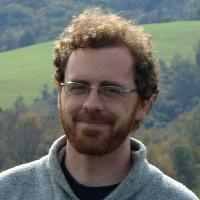Fergus, Craig
GIS Lab Manager
Craig Fergus is a spatial analyst and manager of the Conservation GIS Lab at the National Zoo and Conservation Biology Institute's Conservation Ecology Center. His current research focuses on using GIS and other tools to examine the connections between landscape patterns and functioning ecosystems locally in Virginia and in Smithsonian study areas around the world.
Craig received his bachelor's degree in wildlife, fish and conservation biology from the University of California, Davis in 2008 and his master's degree in biology from Central Washington University in 2012. His master’s research examined the landscape genetics of an American pika population around Interstate Highway 90 in preparation for a now complete wildlife crossing structure. Craig joined the Smithsonian Conservation Biology Institute as an intern and contractor before becoming a staff analyst in 2018.
Like many wildlife enthusiasts, Craig imagined he would be a field biologist and out of school spent a year straight in the field with the U.S. Forest Service and California Fish and Game Department looking for goshawks, martins and salmon. However, in the off-season, he took a job mapping the locations of these threatened species and has continued down that past ever since.
Positions
- Core Team Member, Working Land and Seascapes, Smithsonian Institution 2019 -
- Lab Manager, Conservation GIS Lab 2022 -
- Changing Landscape Initiative - Spatial Analyst and Lab Manager, Working Land and Seascapes, Smithsonian Institution 2018 - 2022
Geographic Focus
- Virginia State or Province
Background And Education
Public Biography
-
Craig Fergus is a spatial analyst and manager of the Conservation GIS Lab at the National Zoo and Conservation Biology Institute's Conservation Ecology Center. His current research focuses on using GIS and other tools to examine the connections between landscape patterns and functioning ecosystems locally in Virginia and in Smithsonian study areas around the world.
Craig received his bachelor's degree in wildlife, fish and conservation biology from the University of California, Davis in 2008 and his master's degree in biology from Central Washington University in 2012. His master’s research examined the landscape genetics of an American pika population around Interstate Highway 90 in preparation for a now complete wildlife crossing structure. Craig joined the Smithsonian Conservation Biology Institute as an intern and contractor before becoming a staff analyst in 2018.
Like many wildlife enthusiasts, Craig imagined he would be a field biologist and out of school spent a year straight in the field with the U.S. Forest Service and California Fish and Game Department looking for goshawks, martins and salmon. However, in the off-season, he took a job mapping the locations of these threatened species and has continued down that past ever since.
Publications
Selected Publications
-
Article
- Punalekar, Suvarna M., Nowakowski, A. J., Canty, Steven W. J., Fergus, Craig, Huang, Qiongyu, Songer, Melissa, and Connette, Grant M. 2025. "Characterizing Role of Spatial Features in Improving Mangrove Classification—A Case Study over the Mesoamerican Reef Region." Remote Sensing, 17, (16). https://doi.org/10.3390/rs17162837. 2025
- Quinn, John E., Fergus, Craig, Hyland, Emilia, Vickery, Caroline, Lacher, Iara L., and Akre, Thomas S. 2024. "Ecosystem Service and Biodiversity Patterns Observed across Co-Developed Land Use Scenarios in the Piedmont: Lessons Learned for Scale and Framing." Land, 13, (9). https://doi.org/10.3390/land13091340. 2024
- Lacher, Iara, Fergus, Craig, McShea, William J., Plisinski, Joshua, Morreale, Luca, and Akre, Thomas S. 2023. "Modeling alternative future scenarios for direct application in land use and conservation planning." Conservation Science and Practice, https://doi.org/10.1111/csp2.12940. 2023
- Fergus, Craig, Lacher, Iara L., Herrmann, Valentine, McShea, William J., and Akre, Thomas S. 2023. "Predicting vulnerability of forest patches to invasion by non-native plants for landscape scale management." Ecological Applications, https://doi.org/10.1002/eap.2857. 2023
- Canty, Steven W. J., Nowakowski, A. J., Connette, Grant M., Deichmann, Jessica L., Songer, Melissa, Chiaravalloti, Rafael, Dodge, Molly, Feistner, Anna T. C., Fergus, Craig, Hall, Jefferson S., Komatsu, Kimberly J., Linares‐Palomino, Reynaldo, McField, Melanie, Ogburn, Matthew B., Velez‐Zuazo, Ximena, and Akre, Thomas S. 2022. "Mapping a conservation research network to the Sustainable Development Goals." Conservation Science and Practice, https://doi.org/10.1111/csp2.12731. 2022
- Ahmadisharaf, Ebrahim, Lacher, Iara L., Fergus, Craig, Benham, Brian L., Akre, Thomas, and Kline, Karen S. 2020. "Projecting land use change impacts on nutrients, sediment and runoff in multiple spatial scales: Business-as-usual vs. stakeholder-informed scenarios." Journal of Cleaner Production, 257 Article 120466. https://doi.org/10.1016/j.jclepro.2020.120466. 2020
- Lacher, Iara, Akre, Thomas, McShea, William J., McBride, Marissa, Thompson, Jonathan R., and Fergus, Craig. 2019. "Engaging regional stakeholders in scenario planning for the long-term preservation of ecosystem services in Northwestern Virginia." Case Studies in the Environment, 3, (1) 1–13. https://doi.org/10.1525/cse.2018.001180. 2019
- Cove, Michael V., Fergus, Craig, Lacher, Iara, Akre, Thomas, and McShea, William J. 2019. "Projecting Mammal Distributions in Response to Future Alternative Landscapes in a Rapidly Transitioning Region." Remote Sensing, 11, (21) 2482. https://doi.org/10.3390/rs11212482. 2019
- Lacher, Iara, Akre, Thomas, McShea, William J., and Fergus, Craig. 2019. "Spatial and temporal patterns of public and private land protection within the Blue Ridge and Piedmont ecoregions of the eastern US." Landscape and Urban Planning, 186 91–102. https://doi.org/10.1016/j.landurbplan.2019.02.008. 2019
- Lacher, Iara L., Ahmadisharaf, Ebrahim, Fergus, Craig, Akre, Thomas, McShea, William J., Benham, Brian L., and Kline, Karen S. 2018. "Scale-dependent impacts of urban and agricultural land use on nutrients, sediment, and runoff." Science of the Total Environment, 652 611–622. https://doi.org/10.1016/j.scitotenv.2018.09.370. 2018
-
Dataset
- Fergus, Craig. 2023. [Dataset] CLI Invasive Analysis Data (coordinates redacted). Distributed by Washington, DC: Smithsonian National Zoo and Conservation Biology Institute. https://doi.org/10.25573/DATA.22336714.V2. 2023
- Fergus, Craig. 2023. [Dataset] CLI Invasive Analysis Model Coefficient Results. Distributed by Washington, DC: Smithsonian National Zoo and Conservation Biology Institute. https://doi.org/10.25573/DATA.22336750.V1. 2023
- Fergus, Craig. 2023. [Dataset] CLI Invasive Field Survey - Analysis Format.csv. Distributed by Washington, DC: Smithsonian National Zoo and Conservation Biology Institute. https://doi.org/10.25573/DATA.19694524.V1. 2023
